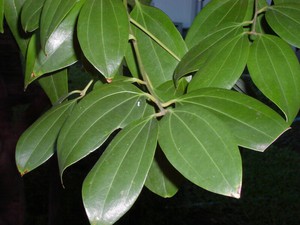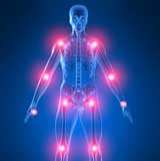
Pinyin: Gui Zhi, Rou Gui (Gui Zhi is from the young branches of cinnamon trees; Rou Gui is the thick bark of the trees.)
Latin: Cinnamomum Verum, Cinnamomum Zeylanicum, Cinnamomum Ioureiru, Cinnamomum Aromaticum, Cinnamomum Loureiroi, Cinnamomum Burmannii
Physical Characteristics
Cinnamon (Cinnamomum verum, synonym C. zeylanicum) is a small evergreen tree 10?15 metres (32.8?49.2 feet) tall, belonging to the family Lauraceae, and is native to Sri Lanka, India, Bangladesh, and Nepal. The bark is widely used as a spice due to its distinct odour. The leaves are ovate-oblong in shape, 7?18 cm (2.75?7.1 inches) long. The flowers, which are arranged in panicles, have a greenish colour, and have a distinct odour. The fruit is a purple one-centimetre berry containing a single seed.*
Common Name
Cassia
Family
Traditional Chinese Medicinal (TCM) Uses*
Cinnamon refers to several plants that belong to the genus Cinnamomum native to Southeast Asia. The bark, rich in essential oil, is used as a flavoring agent and as a spice. Medicinal uses include appetite stimulation, treatment of arthritis, inflammation, and dyspepsia. In traditional Chinese medicine, cinnamon is used with other herbs in decoctions for cold. In vitro studies have demonstrated that cinnamon has antioxidant, anti-inflammatory, immunomodulatory, and antimicrobial properties.*
Cinnamon has been studied in clinical trials for type 2 diabetes but results are conflicting. Well-designed clinical trials are needed to determine efficacy. Use of cinnamon flavored products has been associated with oral adverse effects. Certain cinnamon products are high in coumarin content that can cause liver damage and can also interact with other drugs. Purported uses: Diabetes, Stomach ulcers, Inflammation, Arthritis.*
In medicine cinnamon acts like other volatile oils and once had a reputation as a cure for colds. It has also been used to treat diarrhoea and other problems of the digestive system. Cinnamon is high in antioxidant activity. The essential oil of cinnamon also has antimicrobial properties, which can aid in the preservation of certain foods. "Cinnamon" has been reported to have remarkable pharmacological effects in the treatment of type II diabetes and Insulin Resistance. However, the plant material used in the study was mostly from cassia and only few of them are truly from Cinnamomum zeylanicum (see cassia's medicinal uses for more information about its health benefits). Recent advancement in phytochemistry has shown that it is a cinnamtannin B1 isolated from C. zeylanicum, which is of theraputic effect on type II diabetes with the exception for the postmenopausal patients studied on C. cassia. Cinnamon has traditionally been used to treat toothache and fight bad breath and its regular use is believed to stave off common cold and aid digestion.*
References
Source: Cinnamon Verum - Cinnamomum Ioureiru Sloan-Kettering Cancer Center; Cinnamon Verum
Natural dietary supplements are designed to offer the body support to promote health, harmony, balance and overall well being.*

 Get Well Natural, LLC
Get Well Natural, LLC  Kidney Function & Regeneration Health
Kidney Function & Regeneration Health  Platelet & Blood Cell Health
Platelet & Blood Cell Health  Prostate, Flow & Function Health
Prostate, Flow & Function Health  General Mind & Body Health
General Mind & Body Health  Heart, Cholesterol & Cardio Health
Heart, Cholesterol & Cardio Health  Allergy-Free Body
Allergy-Free Body  Anxiety & Stress
Anxiety & Stress  Blood Platelet Counts & Function
Blood Platelet Counts & Function  Blood Pressure Health
Blood Pressure Health  Kidney Function Health
Kidney Function Health  Immune System Health & Balance
Immune System Health & Balance  Prostate & Urinary Health Function
Prostate & Urinary Health Function  Blood Sugar Balance
Blood Sugar Balance  Cardiovascular Heart Health
Cardiovascular Heart Health  Detoxification & Healthy Cells
Detoxification & Healthy Cells  Women's Health
Women's Health  Liver Regeneration
Liver Regeneration  Pain-Free Body
Pain-Free Body  Water & Air Filtration
Water & Air Filtration 


